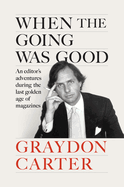
Vanity Fair magazine offers readers a way to feel highbrow (esteemed writers! Long-form journalism! Artistic elegance!) while consuming celebrity profiles. During his 25-year editorship, which concluded in 2017, Graydon Carter refined this winning highbrow-middlebrow blend, which is also present throughout his light-shedding, self-effacing, and tastefully dishy memoir, When the Going Was Good: An Editor's Adventures During the Last Golden Age of Magazines.
Carter grew up middle class in the 1950s, mainly in Ottawa, Canada; books and movies suggested that glamour awaited him elsewhere: "I wanted an adult life of cocktails, cigarettes, bridge games, witty banter, and clothes that weren't tartan." After getting his feet wet at the Canadian Review, Carter finagled a writing job at Time and moved to New York in 1978. In 1986, he cofounded the satirical magazine Spy; following a pit stop at the New York Observer, he landed at Vanity Fair. Carter likens this three-magazine hop to "moving from a youth hostel to a five-star hotel."
Despite Carter's gadabout image--he needs two chapters to cover Vanity Fair's annual Oscar party--When the Going Was Good reveals that he's less of a party animal than a family man. Another surprise from the mind behind the withering Spy: Carter's overall warmheartedness. He largely reserves his malice for the odd bad hire and for the 47th U.S. president, with whom Carter has had a famously testy relationship. As he regales readers with tales of a bygone era in magazine publishing, Carter calls to mind someone holding forth at a leisurely expense-account lunch. --Nell Beram, author and freelance writer

